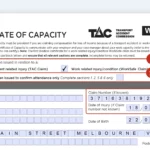Is an injury always necessary for someone to be paid compensation as a result of a transport accident in Victoria?
This question arose in a recent case handled by Arnold Dallas McPherson Injury Lawyers. Tragically, the case involved a car accident resulting in the death of a baby. She was the passenger in a car driven by a family member, and other family members were also in the vehicle. Another vehicle collided with the car, causing the infant’s death.
The people responsible for the other vehicle have been charged with culpable driving.
The TAC is liable to pay the funeral expenses in such circumstances, as well as providing family counselling. However, the young parents of the deceased infant did not wish to pursue such counselling, nor did they suffer any “injury” as a result of their infant daughter’s death. Additionally, the deceased child had a young sibling.
Is the family entitled to any compensation as a result of a death of a family member?
The Victims of Crime Assistance Act 1996 provides financial support to “related victims” (that is, immediate family members of the deceased) affected by violent crimes resulting in the death of a person for their “grief and distress”. Sections 12 and 13 of this Act outline the assistance available to related victims.
Total Compensation for All Related Victims
When a primary victim dies due to a violent crime, the combined financial assistance for all related victims is capped at $100,000, minus any amount already allocated for the primary victim’s funeral expenses. However, in special situations, this limit can be exceeded to provide additional support to a related victim.
Compensation for Individual Related Victims
Each related victim can receive up to $50,000 in financial assistance. This amount can cover:
- Counselling Services: Expenses for reasonable counselling services already incurred or expected to be incurred.
- Medical and Funeral Expenses: Medical or funeral expenses that are a direct result of the primary victim’s death.
- Distress: Compensation for the emotional distress experienced due to the primary victim’s death.
- Financial Dependence: Loss of financial support that the related victim would have likely received from the primary victim in the two years following their death.
- Other Necessary Expenses: Other reasonable expenses incurred or expected to be incurred directly because of the primary victim’s death.
In exceptional cases, additional amounts may be awarded to assist the related victim’s recovery from the primary victim’s death. It’s important to note that compensation is not provided for loss of or damage to property.
These provisions ensure that individuals closely connected to a deceased victim receive financial support to help them cope with their loss and related expenses.
In this case, the Victims of Crime Assistance Tribunal had no trouble in awarding the statutory maximum figure for compensation, split evenly between the parents and with a small amount payable to a sibling of the deceased child.
















